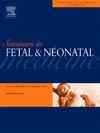Fetal neuroimaging applications for diagnosis and counseling of brain anomalies: Current practice and future diagnostic strategies
Abstract
Advances in fetal brain neuroimaging, especially fetal neurosonography and brain magnetic resonance imaging (MRI), allow safe and accurate anatomical assessments of fetal brain structures that serve as a foundation for prenatal diagnosis and counseling regarding fetal brain anomalies. Fetal neurosonography strategically assesses fetal brain anomalies suspected by screening ultrasound. Fetal brain MRI has unique technological features that overcome the anatomical limits of smaller fetal brain size and the unpredictable variable of intrauterine motion artifact. Recent studies of fetal brain MRI provide evidence of improved diagnostic and prognostic accuracy, beginning with prenatal diagnosis. Despite technological advances over the last several decades, the combined use of different qualitative structural biomarkers has limitations in providing an accurate prognosis. Quantitative analyses of fetal brain MRIs offer measurable imaging biomarkers that will more accurately associate with clinical outcomes. First-trimester ultrasound opens new opportunities for risk assessment and fetal brain anomaly diagnosis at the earliest time in pregnancy. This review includes a case vignette to illustrate how fetal brain MRI results interpreted by the fetal neurologist can improve diagnostic perspectives. The strength and limitations of conventional ultrasound and fetal brain MRI will be compared with recent research advances in quantitative methods to better correlate fetal neuroimaging biomarkers of neuropathology to predict functional childhood deficits. Discussion of these fetal sonogram and brain MRI advances will highlight the need for further interdisciplinary collaboration using complementary skills to continue improving clinical decision-making following precision medicine principles.

 求助内容:
求助内容: 应助结果提醒方式:
应助结果提醒方式:


